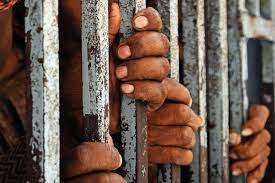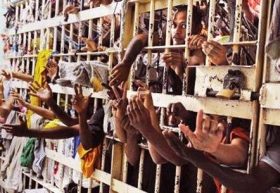
Prisoners are in news nowadays, for the right reasons. Administrators and ruling governments come and go ,some issues are flagged, some are acted upon also but in general, this section of society especially residing in smaller jails continues to suffer. As such, everywhere number of undertrials far exceeds that of convicts.
2) While India’s oldest jail is located in Chennai, the biggest one – Tihar Jail of Delhi happens to have a large number of over 12,000 prisoners in its seven Central jails. Of the total 5,54,000 prisoners in India, 4,27,000 as on date, happen to be undertrials housed in Central jails, District jails, Sub jails and Women jails. As per NCRB, Women prisoners constitute 4.3% of prisoners in India and 11,916 of them happen to be undertrials.
3) As per Jail Manual, habitual offenders are to be kept away from the first time offenders and the convicted, old & young ones are also to be kept apart. Yet one hears about incidents of teasing, abusing, harassment, over crowding and sexual harassment on a regular basis. Thus experiences inside jails can be from depressing to frightening.
DEVELOPMENTS OF RECENT PAST

4)In November, 2022, the Supreme Court was pleased to order release of six convicted prisoners from a prison in Vellore, Tamil Nadu. They were convicted in connection with assassination of former P.M., Rajiv Gandhi. Some of the Sri Lankan convicts, however, continue to be in jail even after being formally released from jail. Similar is the plight of NSA detainees all over country, who are not released even after positive review of their cases at the highest levels, as charges framed under other Acts are not dropped at the same time. Such an experience defeats the whole purpose of reforming an undertrial or a convict.
5).Dust on the issue of Rajiv Gandhi murder convicts had not even settled down that reports and video clips pertaining to alleged misuse of prison facilities by Satyendra Jain, a Minister of Delhi Government began being flashed everywhere.
Issues,such as, taking personal service, food different from Jail Menu, use of Cell phone etc came to notice. Subsequent to an Inquiry, followed by a Security Review by the L.G., need to have modern gadgets to control smuggling and installation of more cell phone signal jammers have been stressed.
Concern Expressed By The President Of India
6) The issue of bringing reforms in the arena of prisons has also drawn attention of the President of India. In a speech, straight from heart at an event organised by the Supreme Court recently, she indicated her own keen observations of having seen tremendous human right violations in Odisha jails, when she happened to visit some of them as Chairman of a State Home Department committee. She made it clear that the inmates living behind bars are not aware of Fundamental Rights & Duties and many of them do not get a chance to get bailed out .Even when an opportunity comes, the very stigma of a convict may make them unfit to adjust in society. Families lose their meagre assets and land while fighting cases. She gave an impression that despite having capable and experienced persons in all three organs of Government , prisoners undergo sufferings and number of jails go on increasing. When we move towards achieving more development, there had to be a check and balance and number of jails should also come down,she added.
Precursors To Awareness About Jail Conditions
7)The Public Interest Litigations( P.I.L.),encouraged and promoted by the two renowned Judges of the Supreme Court, namely, Justice Krishna Aiyer and Justice P.N. Bhagwati, gave a fillip to the whole new legal mechanism in the early eighties of the last century. Through a PIL, the Supreme Court attempted to in novate a new jurisprudence of access to justice as also to evolve a new doctrine of accountability of the State for the violations adversely impacting interest of weaker sections. Thus Fundamental Rights were converted into positive rights with a view to correct the bias of the legal process against the deprived sections and the helpless. The apex Court began listening to miseries of the common man and started addressing the relevant public policies.
The Courts gradually also, felt the need to relax the principle of “Locus standi”, whenever it was considered rational. They alerted and reminded the administrators of their failings and lapses and thus provided them with an opportunity to improve. Thus whole approach appeared community oriented.
Notable Judgements of Supreme Court in Regard to Prisoners
8) The case Kadra Pahadia vs the State of Bihar(1981,S.Court) was taken up by the Court at the request of Basudha Bagamwar, a public spirited citizen. Her letter highlighting the plight of undertrial prisoners(many being young boys) languishing in jails for more than a decade ,was treated as a petition and apex court agreed to grant an appropriate remedy.
In Khatri vs State of Bihar(1981,S.Court), a public spirited advocate filed a petition exposing the cruel and heinous act of blinding the undertrial prisoners in Bhagalpur jail of Bihar. The Supreme Court ruled in favour of the suffering undertrials and passed severe strictures against the State Government.
9)Another case pertaining to undertrials was that of Rudal Shah. Shah, accused of murder and arrested in 1953, had got acquittal order from a court in 1968. He was, however, not released on alleged grounds of insanity. Only after a Law student filed a petition in the Patna High Court and a lawyer filed another petition in the Supreme Court that it was discovered that twice (1972& 1977), Shah was declared sane by the doctors ,yet he continued to languish in jail.The Supreme Court ordered his immediate release and State of Bihar was directed to pay Rs.35 thousand as compensation to him.
Subsequent to these landmark judgements, cases of many other undertrial prisoners were taken up and desired justice was ensured. The case relating to torture of undertrials in Chhatterpur jail in M.P.(1982,S. Court) and the case pertaining to illegal detention of certain prisoners in Hazaribagh Jail of Bihar( Veena Sethi vs State of Bihar,1983,S. Court) may be worth mentioning in this regard.
Apart from the violations of the human rights of the undertrial prisoners, vital issues, such as, giving harmful Khesari Dal as wages to labourers, plight of women in police lock ups, violations of Labour laws by the Governments etc were also highlighted through the public interest ilitigations.
10) In the case Sheela Barse vs State of Maharashtra(1983,S. Court),the court once again considered a letter as a Writ Petition. The allegation of custodial violence against the women in the Police lock ups in Bombay were levelled. While dealing with it, the Supreme Court laid down certain guidelines for ensuring protection against torture and mal treatment to women in the Police lock-ups. In addition, the Court also issued directions for making available legal aid to indigent prisoners in general. Yet in another case, a journalist of Indian Express, through a petition filed in the Supreme Court, exposed the flesh trade in Dholpur District of Rajasthan(Kamla case,1981,S.Court).
Interventions By The NHRC
11) The National Human Rights Commission ,ever since its establishment in 1993, is regularly taking up the issue of jail reforms through the visits to various jails by its Members and Special Rapporteurs. They follow a prescribed format of inspection and as a result of their detailed reports, the Commission has been making meaningful recommendations to the State Governments. In some instances, even minimum facilities not extended to prisoners or for that matter, overcrowding of jails have been addressed and stressed upon.
12) To Sum Up,
Relief granted and compensations awarded to a select few is well taken by the interventions indicated above. But in actual reality, undertrials continue to languish and that legal aid machinery too seems to have become ineffective. There is an urgent need therefore, to have more Judges like the legendary Justice Aiyar and Justice Bhagwati who need to be ably supported by proactive & honest bureaucrats & members of civil society.

About the Author : Dr. Aaloc Srivastav, Ex CS , Sikkim is a Senior Retd Bureaucrat and passionate about writing on his favourite subjects . The views shared by the author are his personal.







Leave a Reply
You must be logged in to post a comment.